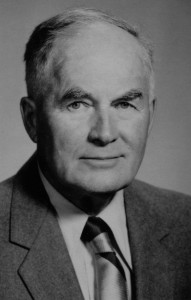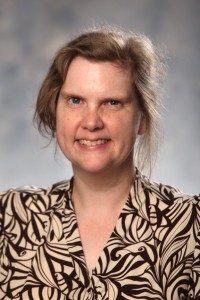UCCS Archives, part of the Kraemer Family Library, will bring campus history to life by recording recollections of key moments in campus development with the very people who made them happen.
Mary Rupp, archives librarian and digital repository coordinator, Kraemer Family Library, is restarting an oral history program designed to capture the history of UCCS in the storyteller’s own words.
“Oral histories are recordings of directed interviews,” Rupp said. “Individuals describe what they experienced in the hope that this information will later be used by others trying to understand the events of the day. The stories are unique and provide context.”
Between 1987 and 1990, interviews with several early UCCS faculty and staff members were recorded to preserve early campus history. For example, in one recording, James Busey, an early faculty member in the Department of Political Science who died in 2007, talked about his first impressions of the campus. Upon arrival, he was yelled at by a building caretaker, likely one of the last employees of the defunct Cragmor Sanatorium, the previous occupant of the property now known as UCCS.
The purpose of recording the oral history interviews, according to Rupp, is to build a collection within the UCCS Archives to supplement the document, image, and media collection of the university’s history. The oral histories provided will not be published or made available on websites. The person interviewed can opt to allow wider distribution.
To listen to a portion of Busey’s comments, click below.

When completed, time indexes of the recordings will be available in the archives to assist researchers and others interested in university history.
Instead of the cassette tapes used to record earlier oral histories, interviews will be recorded as uncompressed files commonly known as WAV files. The recordings will be preserved and copies made available to play on current equipment.
Rupp plans training sessions for interviewers and the Kraemer Family Library will loan the necessary equipment. Details of the estimated four hour training sessions include practice with the recorders as well as reviewing best practices for oral histories and interviewing techniques. Multiple sessions will be offered to allow small groups.
“The narrator is the person being interviewed,” Rupp explained. “That role requires the interviewer not only ask the right questions but be able to move the discussion along and keep it on topic.”
Rupp will match trained interviewers with people interested in sharing their stories as well as providing research assistance to help interviewers prepare.
“Oral histories are a methodology used by many disciplines,” Rupp said. “It’s important that we use these techniques to preserve our own university’s history as we prepare for the 50th anniversary celebration in 2015.”
Rupp encouraged faculty and staff to become involved and to encourage student participation in the project. Those who are interested should contact her directly at [email protected] or 255-3094.


I was a student of Prof. Busey in his introductory political science class at UCCS in Fall Semester 1965. Dr. Busey was a lively teacher, sharp mind with a sense of humor. He treated the students with respect and was always ready to explain, even simply political matters, to any student who would ask questions in class. Being a professor myself, of philosophy, I very much appreciate, after 50 years being Dr. Busey’s student, his great Socratic quality.
Prof. Ernest Wolf-Gazo, B.A. GWU, Ph.D. Bonn University, Germany 1969.